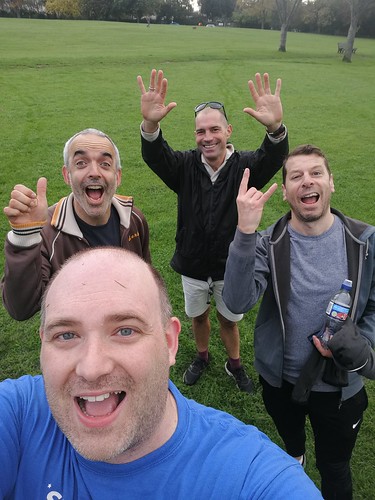The other day I was accused of having a quixotic attitude to issues of workplace culture. Aside from having never been accused of being an idealist in my life, this has irritated me enough to stick with me, so I'm going to write something about it.
First of all, in British English, "quixotic" means:
"preoccupied with an unrealistically optimistic or chivalrous approach to life; impractically idealistic"
This is by the
Collins dictionary definition.
For me, the emotional component of the word comes from its origins in the novel Don Quixote where it refers to the protagonist. Depending on your reading, he's on a noble quest to bring back the better ideals of times gone by, or he's hopelessly deluded. Either way, he repeatedly fails to achieve anything - usually while being mocked (and beaten) by those around him.
So it is in this context that I can't say I was thrilled by the comment. I've written many times about my overriding feeling that
I'm not really achieving anything in an attempt to show myself that it's not actually true. To have this combined with the suggestion that
the reason I do what I do is deluded definitely hurt.
Passed through my emotional filter, the rough translation of all the above is "what you talk about is insane, you don't know what you're doing and you're failing at it".
We were talking about toxic culture in the tech industry and whether it can be "fixed". My position is that, even if all we're doing is only creating bright spots in an otherwise toxic swamp, things can change. Since I'm now in a position of senior leadership in this industry it's partially up to me to do something where I can.
Example the first: I know many technologists who invest heavily of themselves in their work and work excessively long hours. Often this behaviour is encouraged, despite the cost to the individual and these people are treated as disposable by the organisations they have enriched when they do reach the point of burnout. Economically sound, but not right.
Example the second: I have a friend who is looking for a new job. She's a talented developer who should have her choice of places to work, but because she doesn't want to work in a toxic
bro-culture she's struggling to find places to even apply.
This is the reality of the tech industry and I reject the idea that we can't do better. Idealistic? Yes, of course. But if I think it's utterly impractical to change the culture around me then I need to get out of this industry. More than that, the whole thing needs burning down and the earth salting to prevent re-growth.
The other part of my summary is that I don't know what I'm doing and I'm failing. This is something I take very personally as, for better or worse, I always try to have a clear plan. I know what I'm doing and why, and I feel working without a plan is failing. In my time in technical leadership I've had ideas, created strategies and seen positive change on the back of it. Of course, I don't know everything but I am very aware of that - I'm not deluded. I have good people to talk to, and I'm adding to that list all the time. What I do have - and this is more important than any of my own input - is enough influence to enable and empower others and create an environment for real cultural change. It is only in my area, of course, but people in my area have a habit of going elsewhere and taking our culture with them...
Now, the title of this post is a deliberate nod towards my writing a whole post aimed at an offhand comment I'm quite sure was not intended as I've written here. In American English, the
Cambridge dictionary definition of "quixotic" is:
"having intentions or ideas that are admirable but not practical"
While this is not where my brain goes, for various reasons I suspect this (and without the additional layers of meaning drawn from linking the word back to the novel) was more the intended definition and to be honest I mostly agree. If my goal is to "fix" the technology industry then I'm clearly going to fail - it is not a practical goal.
However. To roughly paraphrase something I remember from a film (or TV show?) "striving for the impossible does not mean toiling in vain". The point (aside from my amazing citation ability) being that pushing for unreachable goals is not ridiculous as it brings you closer to where you want to be, even if you never reach it - asymptotic behaviour for those of a mathematical persuasion.
While failing to source that, I found this relevant quote from
Mikhail Bakunin:
"By striving to do the impossible, man has always achieved what is possible. Those who have cautiously done no more than they believed possible have never taken a single step forward."
I'm not sure what it means that I'm now quoting a revolutionary anarchist.
The Newsroom uses the story of Don Quixote as a major theme for the show. It links it to the
Greater Fool theory.
"The greater fool is actually an economic term. It’s a patsy. For the rest of us to profit, we need a greater fool - someone who will buy long and sell short. Most people spend their life trying not to be the greater fool; we toss him the hot potato, we dive for his seat when the music stops. The greater fool is someone with the perfect blend of self-delusion and ego to think that he can succeed where others have failed. This whole country [America] was made by greater fools."
Sloan Sabbith, The Newsroom
Do I think I know better than those who came before me? No. But I do know I can make a difference and I intend to do so. It's why I do what I do and I have the original commenter to thank for getting under my skin enough to analyse my thinking and reaffirm that important point. That is mostly why I write this blog.
We should always be seeking to improve, whether it is through evolution or revolution. We should always be seeking to build that rose-tinted version of the world that could exist (quote paraphrased from some wonderful folk at work). Personally, I hate the idea of stagnation. I need to be moving towards a better future - and by that I mean actually improving things and not simply maintaining or (in many ways worse) just fighting a rearguard action. Anything less does feel like failure.
Oh my goodness. Have I become an idealist?!


